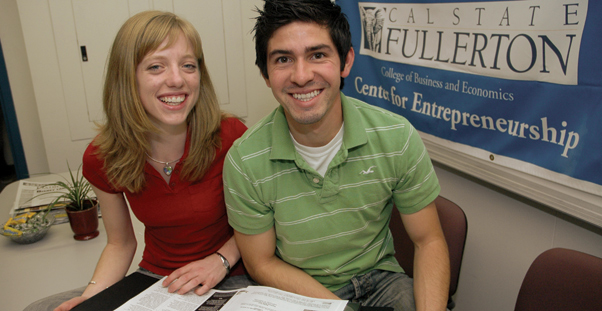A Win-Win Situation
Business Students Serve as Consultants for Area Businesses
January 3, 2008
By Pam McLaren
Businesses seeking fresh ideas and perspectives can turn to Cal State Fullerton’s Small Business Institute where student teams take the skills and knowledge they learn in the classroom and apply them to a real-world environment.
Since the 1990s, nearly 2,000 Orange County firms have benefited from this program. Students — working with area businesses over a 12-week period — develop recommendations about management, marketing, new product development and other areas requested by their “clients.”
“It’s a win-win situation for both parties,” said Michael Ames, director of the institute and professor of management. “Our student teams analyze how these different businesses work and make recommendations for improvement and growth.
“The experience is wonderful for the students, who have fresh perspectives and no axe to grind,” Ames added. “As a result, business owners find their observations thought-provoking. Often the team’s work inspires profit improvement.”
Student efforts also have garnered national recognition. For 17 years in a row, teams have placed in the top ten of the National Small Business Institute Case of the Year Award from the Small Business Institute Director’s Association. CSUF graduate students have taken the top honors in the graduate division more than five times; undergraduate teams have taken either first or second place honors in their division, and are four-time winners on the regional level.
“I love that it’s hands on,” said David Vera, a senior business administration major working on three consulting projects, including one for his family’s printing company.
Student groups are given summaries of what company leaders think they need. Their key task, Vera said, “is to try to get to the root issues.”
Following meetings with their clients, students provide
their consulting report, or case study.
Such projects, “bring all the various classes together. It reinforces
the lessons and brings home the importance of what we learned,” Vera
said.
“It seems very daunting but we all jump into it together,” said Linsey Crow, who is working on two consulting projects, and launching her own wedding consulting company. “As we put our heads and skills together, the task seems more manageable.”
Crow said that the hardest, as well as the most rewarding, part of the consulting projects “is learning to work together. It’s hard to break down the project into parts but it’s good that everyone wants to be a productive team member. Because we’re entrepreneurs, we’re all driven.”
Companies have found the program rewarding. In 2002, John Christy, president of T. Christy Enterprises, worked with an undergraduate team under the supervision of Farouk Abdelwahed, associate professor of management.
“They did a fine job,” Christy said. “It was clear, concise and on point … a tremendous value.” Alumna Stephanie M. Lomibao, who worked on the Christy Enterprises project, now is a vice president at Washington Mutual. “The consulting project was rigorous, but I now know that it prepared me for the demands of the workforce,” she said. In particular, the team-management strategy and approach remain a vital take-away, better taught by hands-on experience than by learned from a textbook.”


